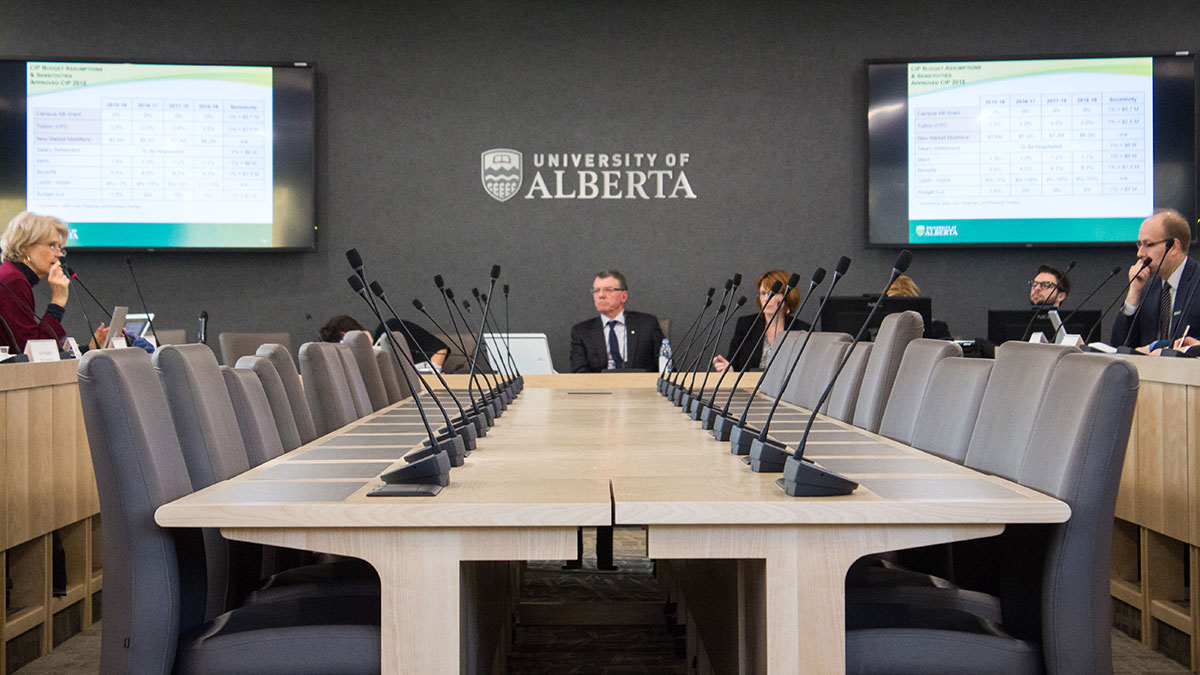GFC reviews academic governance, online evaluations
 Christina Varvis
Christina VarvisGeneral Faculties Council (GFC) is the body of academic governance at the University of Alberta. It is governed by the Alberta Post-Secondary Learning Act and is responsible for the academic and student affairs of the U of A.
GFC is chaired by U of A President David Turpin and is composed of 158 voting members, including university administration, Deans, faculty, students and staff.
GFC meets five times per academic year, and the open session meetings are open to the public. The next meeting will take place on Monday, March 21, 2016 at room 2-100 in University Hall.
Reform of GFC and academic governance structure
U of A President David Turpin sought opinion and advice from GFC members regarding the council’s role in academic governance. He said “nothing is written in stone,” and offered the opportunity to visit the rules of GFC and how to move forward.
Students’ Union Vice-President (Academic) Fahim Rahman said there needs to be more value in discussions tabled at GFC. Rahman said he was concerned about majority of items on the GFC agenda, especially since GFC is considered one of the highest decision-making and governing bodies at the U of A.
For Graduate Students Association President Colin Moore, GFC has been historically “boring.” Since taking his seat on GFC, Moore said he hasn’t felt invested in conversations surrounding action items at GFC, because he felt like decisions had already been made at sub-committee levels, and GFC is merely there for approval.
GFC member Brayden Whitlock said “it doesn’t seem as if GFC has any real power.” Whitlock, who recently published an opinion article in the Winnipeg Free Press titled, “Who Watches the Government Watchdogs,” which evaluated “how well academic freedom is preserved,” graded Alberta universities a B-. Since GFC is regulated by the Alberta Post-Secondary Learning Act, their “real power” is mandated by provincial law, Whitlock said.
Several members brought up the delegation of authority, where GFC would appoint a sub-committee to further dissect an issue, discuss the issue’s impact on the university and offer suggestions which would then be passed on to the GFC main body for approval.
Department of Earth and Atmospheric Sciences professor Jeremy Richards said he felt like “decisions were made elsewhere,” thus making conversations “disempowering and disinteresting.”
U of A Provost and VP (Academic) Steven Dew said the delegation of authority at the sub-committee level provides a “quality of review that you would never contemplate wasting the time of 150 people.” He did acknowledge the need for a better feedback mechanism, but did not recommend getting rid of some discussion at the sub-committee level, as they provide an opportunity for a group to explore an issue several times in depth before it is presented to GFC.
Another concern in GFC regarding engagement was attendance. At the Jan. 25 meeting, approximately 70 GFC members were signed in out of 150.
Turpin said all comments would be taken into consideration and further discussed at the next GFC meeting in March later this year.
Online University Student Ratings of Instruction responses down 15 per cent
Representatives from Scott Delinger of Information Services & Technology and Sarah Forgie, Vice-Provost (Learning Initiatives) presented a report regarding the transition of instructor evaluations to electronic means. The shift to electronic evaluations was implemented as a pilot in Fall 2013, where 49 per cent of instructor sections were approved to participate in the pilot.
In the 2014-–15 academic year, the online evaluations were delivered campus-wide. The report found that overall, response rate dropped by 15 percentage points compared to paper evaluations the year prior. While response rate declined, the median scores of “Overall, this instructor was excellent” and “Overall, the quality of this course was excellent,” remained consistent, from 4.6 to 4.5, and 4.3 to 4.2, respectively.




